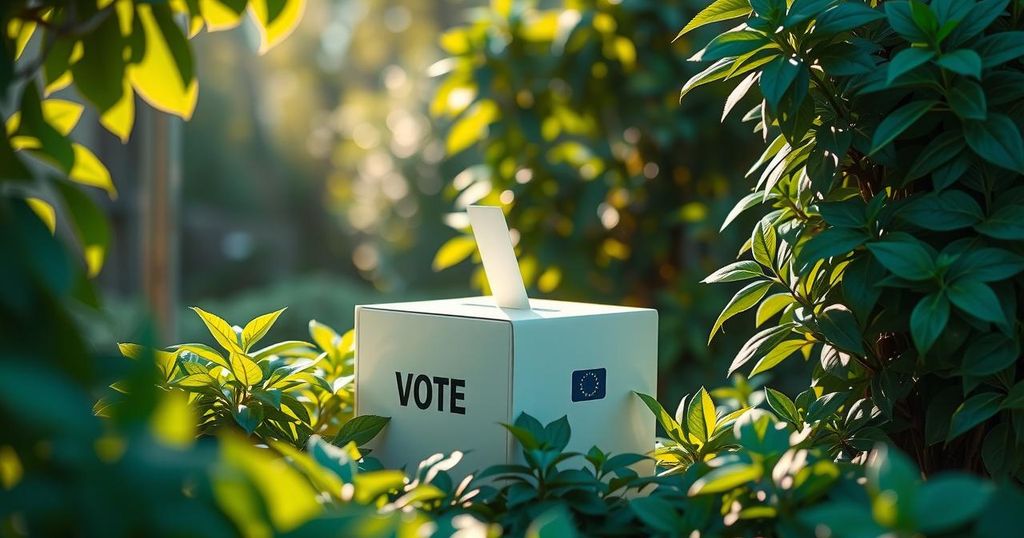Ecuador’s Presidential Election: Noboa Poised for Victory Amid Violence

Incumbent President Daniel Noboa is expected to win Ecuador’s presidential election amid escalating violence, with early exit polls showing him at over 50 percent. Approximately 14 million voters participated under intense security measures. The election reflects the nation’s severe crisis marked by drug trafficking and economic instability.
Polls recently closed in Ecuador, where incumbent President Daniel Noboa is anticipated to secure another term in the face of escalating violence. Early exit polls indicate that Noboa is expected to receive slightly over 50 percent of the vote, allowing him to circumvent a runoff against leftist opponent Luisa Gonzalez, who garnered around 42 percent. The final vote count is yet to be disclosed.
Approximately 14 million Ecuadorians voted amid heightened security measures, as the nation grapples with its most severe crisis in fifty years. The campaigns have largely focused on issues such as a weakening economy and rampant cartel violence that have transformed Ecuador from a safe haven into one of the most perilous locations in the region.
Heavily armed military personnel were stationed at polling locations throughout the country, responding to warnings about potential attacks on the electoral process. Notably, early voting infractions were limited to approximately 20 individuals who violated a three-day alcohol prohibition. The seriousness of the situation is highlighted by security concerns that trailed candidates during the electoral campaign, following past incidents involving political assassinations.
Candidate Gonzalez acknowledged the pervasive fear surrounding the election, stating, “We are only human; of course, you feel afraid… There are intelligence reports that say there are risks and that they want to take my life, but there is a bigger challenge here. There is a challenge to transform the country.”
Noboa, at 37 years of age, is among the youngest leaders globally, relying significantly on a modern social media campaign focused on his youthful approach and tough stance on crime. His efforts to energize the electorate included posting a video of himself performing music, juxtaposing a casual demeanor against his stringent policies aimed at curtailing violence.
Ecuador’s current crisis is compounded by escalating drug trafficking activities, particularly as cocaine cartels target emerging markets in Europe, Australia, and Asia via the country’s ports. This shift in drug market dynamics has contributed to soaring rates of violence, including murder, kidnapping, and extortion, demanding the government’s immediate attention and action.
In response to these dire circumstances, President Noboa proclaimed a state of emergency, mobilizing military forces to maintain order and protect the election process. This has raised concerns among human rights organizations regarding potential abuses, drawing attention to tragic cases such as the murder of four boys discovered near a military base.
As the country endures this difficult period, fears persist regarding the detrimental effects on tourism and foreign investment, deepening economic troubles. Noboa has sought support from the International Monetary Fund to bolster an ailing economy, while preparing for the return of thousands of migrants likely to be expelled by the U.S. administration, affecting vital remittance flows.
Merchants and citizens express apprehensions about the country’s economic future, anticipating increased unemployment and insecurity, with Vinicio Colcha remarking, “It is a dark outlook.” Ecuador stands at a crucial juncture, grasping for stability amid a landscape marked by fear and uncertainty.
Ecuador is currently grappling with a severe crisis characterized by significant violence and insecurity, primarily fueled by drug trafficking and cartel warfare. This shift has drastically changed the country’s safety profile, which was once seen as one of the safest in the region. As the presidential election unfolds, pressing issues such as economic decline and public safety concerns dominate the discourse, reflecting the urgent need for effective governance and intervention.
Ecuador’s recent presidential election exemplifies the deep challenges facing the nation, with incumbent Daniel Noboa poised for victory amidst heightened violence and security concerns. As he continues to navigate a complex landscape marked by drug-related crime and economic turmoil, the path forward remains precarious. The outcome of this election will ultimately shape Ecuador’s response to these pressing issues and its journey towards recovery and stability.
Original Source: www.thedailymail.net







